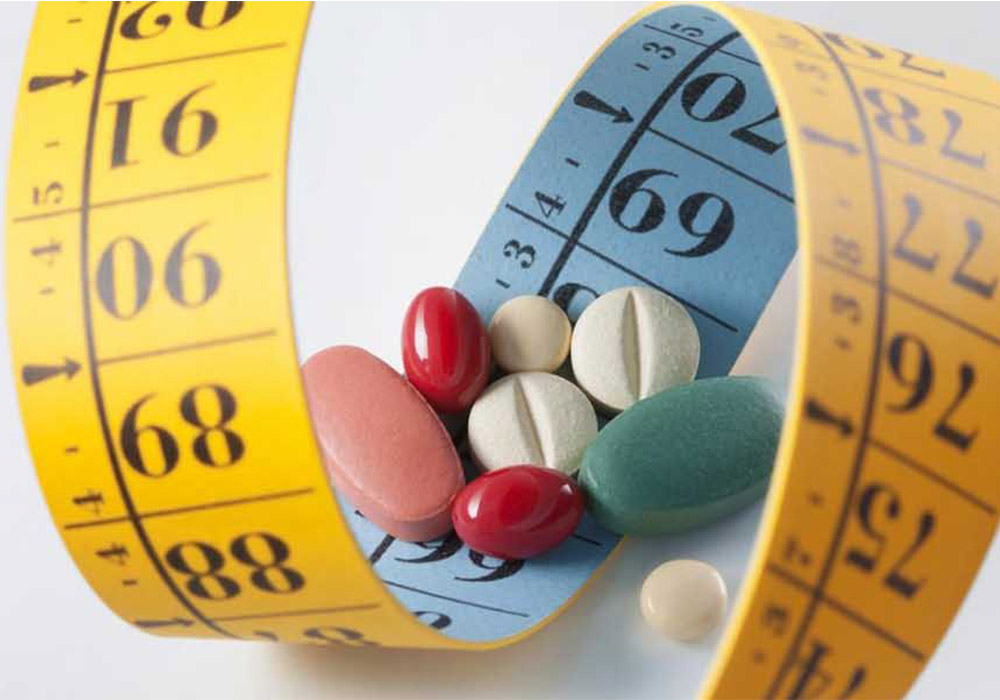Side Effects of Slimming Pills
Slimming medications are among the options available for weight loss and can be effective in some cases. However, using these drugs without considering their side effects may pose risks. The side effects of slimming drugs can range from mild to severe and include digestive problems, sleep disturbances, mood changes, and even more serious complications such as cardiovascular issues. Therefore, before starting any pharmaceutical treatment for weight loss, consulting a physician and carefully evaluating the benefits and drawbacks is essential.
In this blog, we will examine the various side effects of slimming drugs and their impacts on general health. You can also use the “Rare Medicines” system (Daroog) to purchase authorized slimming medications.
Types of Slimming Pills Based on Mechanism of Action
Slimming drugs differ in their mechanism of action; it is advisable to familiarize yourself with the types when purchasing:
Appetite Suppressants:
These help you feel fuller, leading to reduced calorie intake. They act on the nervous system or hormones related to hunger to decrease your desire to eat and assist in weight management.
Nutrient Absorption Inhibitors:
These reduce the calories your body absorbs. By preventing the absorption of certain nutrients like fats in the digestive tract, these drugs lower the amount of calories your body receives and can be effective in weight control.
Fat Burners:
They help increase the calorie-burning rate in the body. By stimulating metabolism and raising energy expenditure, these drugs can accelerate the weight loss process and reduce excess fat.
Indications for Using Slimming Pills
In certain situations, a doctor may prescribe weight loss medication, for example:
If your Body Mass Index (BMI) is over 30.
If your BMI is over 27 and you have serious obesity-related conditions such as diabetes or hypertension.
Before prescribing the medication, the doctor will review your medical history and health status and discuss the pros and cons of weight loss drugs with you. It is important to remember that slimming pills are not suitable for everyone. In particular, if you are pregnant, breastfeeding, or planning to become pregnant, you should avoid these medications.
Types of Slimming Drugs Available in the Market
Satellite Slimming Drugs
Satellite slimming drugs usually refer to those sold through advertisements on social media and various websites. These drugs often claim to rapidly reduce weight and improve metabolism. Many of these medications may have serious side effects, including heart problems, high blood pressure, and digestive disorders. Most of these drugs are not approved by health authorities, and their long-term effects may be unknown. Weight loss resulting from these drugs is usually temporary and weight often returns quickly after stopping the medication.
Although satellite slimming drugs may seem attractive, it is crucial to consult your doctor before use and consider their side effects and lack of scientific approval. The best way to lose weight remains a combination of a healthy diet and regular exercise.
List of Unauthorized Satellite Slimming Drugs
In the world of slimming drugs, some unauthorized products are sold that may have serious side effects. For example, “Magic Slim” claims to increase metabolism and eliminate excess fats. This drug usually contains amphetamines and caffeine, which can be dangerous for health.
Other drugs in this category include “Sliming” and “Sheng Yuan Fang,” known for reducing appetite and boosting fat burning. Their compositions also include amphetamines, and their side effects can include increased heart rate, blood pressure, and risks of heart and brain strokes.
Some brand names of these drugs and supplements are Metabolife, Metrim, Herbalife Adiphen, Thermolife, Thermalean, Lipodrene, Zymax, Genicil, Thermo Slim, Ultralipolean, Time Life, and Xenadrine.
Using these drugs without medical supervision can have serious consequences; therefore, it is recommended to consult a doctor before taking any slimming supplements.
Slimming Drugs with Ministry of Health Approval but Not Genuine
[Note: The original text seems to stop here; if you want, I can help you translate or add more about these.]
Many weight loss medications are marketed as products approved by health authorities. However, such approvals do not necessarily guarantee that these drugs are entirely safe and effective. In many cases, approval is granted based on the presence of one or more active ingredients, while comprehensive evaluation of their side effects remains incomplete.
This category also includes drugs that, despite having official approval, have counterfeit versions widely available on the market. For instance, Alpha Slim falls into this group. Although Alpha Slim is an approved slimming drug, it is associated with numerous side effects. Additionally, counterfeit Alpha Slim products are prevalent, often causing more severe adverse effects, and many consumers find it difficult to distinguish between genuine and fake versions.
Herbal weight loss products:
Many of these are promoted as natural and safe; however, they may contain harmful chemicals or excessive amounts of caffeine and amphetamines.
Dietary supplements:
Some supplements marketed as weight loss aids may contain only vitamins and minerals, lacking any proven efficacy in reducing body weight.
Appetite suppressant products:
Typically containing stimulants, these products can cause serious side effects, yet are often sold as approved medications without adequate regulation.
Commonly used weight loss drugs in pharmacies
Below is an overview of some widely used weight loss medications and their mechanisms of action:
Orlistat (Alli and Xenical)
Orlistat is a frequently prescribed weight loss drug that functions by inhibiting fat absorption in the intestines. It is available as a prescription medication (Xenical) and over-the-counter (Alli). Common side effects include gastrointestinal disturbances such as bloating and diarrhea.
Fat absorption inhibitors like Orlistat may cause side effects including flatulence and oily, loose stools. Rare cases of liver injury have been reported with lipase inhibitors such as Alli and Xenical. Patients should monitor for signs of liver dysfunction, including pruritus, jaundice, abdominal pain, loss of appetite, pale or dark stools, and dark urine.
Phentermine
Phentermine is a prescription appetite suppressant commonly used for weight management in obese individuals. It reduces appetite and can increase energy expenditure. Potential adverse effects include elevated heart rate and hypertension.
Stimulant fat burners such as Phentermine (marketed as Adipex-P) may induce insomnia, increased blood pressure, tachycardia, restlessness, and the risk of dependence. Incorrect dosing may result in misuse and withdrawal symptoms upon discontinuation.
Garcinia Cambogia Extract
This herbal supplement is marketed as a natural weight loss aid, purported to reduce body fat and suppress appetite. However, scientific evidence supporting these claims remains insufficient.
Green Coffee Bean Extract
Derived from unroasted coffee beans, this supplement is promoted as a natural fat burner. Some studies suggest it may aid weight loss, but results are inconclusive and require further validation.
Sibutramine (Meridia)
Sibutramine is an appetite suppressant prescription drug that has been banned in many countries due to serious adverse effects, including an increased risk of cardiovascular events such as heart attack and stroke.
Injectable weight loss medications for Type 2 Diabetes
New injectable drugs such as Zepbound, Ozempic, and Saxenda have been approved specifically for chronic weight management and can facilitate weight loss of up to 20%. Gastrointestinal side effects are common and may necessitate treatment discontinuation in some patients.
Saxenda (Liraglutide) is a prescription injectable drug also indicated for Type 2 Diabetes. It aids weight loss by suppressing appetite and enhancing satiety.
Medications like Liraglutide (Saxenda), Semaglutide (Wegovy), and Tirzepatide (Zepbound) carry a boxed warning regarding the potential risk of thyroid C-cell tumors. This risk has been identified in rodent studies; however, it remains unclear whether these agents induce medullary thyroid carcinoma (MTC) or other thyroid tumors in humans.
Individuals with a personal or family history of medullary thyroid carcinoma (MTC) or multiple endocrine neoplasia type 2 (MEN 2) syndrome should avoid using these medications.
If you experience swelling or lumps in the neck, hoarseness, difficulty swallowing, or shortness of breath, inform your physician immediately, as these symptoms may indicate thyroid cancer.
These drugs may also cause pancreatitis, gallbladder issues, kidney problems, visual disturbances (such as diabetic retinopathy), increased risk of hypoglycemia, or suicidal thoughts and behaviors.
Central Nervous System (CNS) Acting Drugs
Medications affecting the nervous system, such as bupropion and naltrexone (Contrave), have side effects including headache, dry mouth, and dizziness, and may also cause gastrointestinal symptoms like nausea and constipation.
Serious and Important Side Effects of Weight Loss Drugs
Weight loss medications can be accompanied by significant and serious side effects, and some carry the potential for dependence and abuse.
Amphetamine-Containing Weight Loss Drugs
These stimulant-derived drugs may cause constipation, dry mouth, restlessness, withdrawal symptoms, and insomnia. They can stimulate the heart, leading to hypertension and tachycardia.
Phentermine-Topiramate Combination Pill
Qsymia (a combination of phentermine and topiramate) is an FDA-approved extended-release weight loss medication. It is restricted because topiramate can cause severe fetal defects in pregnant women. Therefore, women must have a negative pregnancy test before starting Qsymia and monthly during treatment.
Contrave (Bupropion-Naltrexone Combination)
Contrave is not approved for depression treatment but contains bupropion, an antidepressant class medication. It carries a boxed warning common to all antidepressants regarding increased risk of suicidal thoughts and behaviors in children, adolescents, and young adults.
Do not use Contrave with other bupropion-containing products, as this may increase the risk of severe side effects. Avoid if you have a seizure risk. Serious psychiatric side effects including mood changes, psychosis, and suicidal ideation have been reported in patients using bupropion for smoking cessation.
Are Herbal Weight Loss Drugs Safe?
If you aim to lose weight, you might consider purchasing completely natural or herbal weight loss products, also known as dietary supplements, available online or in stores. Chromium, green tea extract, and guar gum are examples of herbal supplements claiming to aid weight loss.
These products may claim miraculous fat-melting properties and appear to be easy weight loss solutions. Some even claim up to 10 kg weight loss in one week, which is misleading and false.
In 2004, the FDA completely banned dietary supplements containing ephedrine (a stimulant) due to severe side effects including heart attack, stroke, and seizures. Many dietary supplements have been recalled because of harmful effects on weight loss or other health issues.
If you plan to use a dietary supplement for weight loss, consult your doctor and avoid suspicious products from the internet that may contain dangerous, unverified, or counterfeit substances.
How to Recognize if Weight Loss Drugs Have Side Effects
Weight loss supplements may appear somewhat beneficial in some cases, but their actual effects are generally minimal. Unfortunately, no supplement or drug effectively induces sustained weight loss.
Weight loss pills may temporarily boost metabolism and help you lose a few kilograms, but these effects quickly diminish. Side effects can manifest in various ways, including cardiovascular problems, hair loss, premature skin aging, and vision deterioration.
The best method for weight loss remains reducing carbohydrate intake and increasing protein consumption, which is far more effective than any weight loss pill.
Take your health seriously and pursue weight loss through scientific and principled methods. You can contact specialized nutrition physicians at any time, from anywhere in Iran or the world, and receive expert counseling on weight loss diets to address your concerns.
Identifying Weight Loss Pills without Side Effects
Determining whether a weight loss pill is truly free of side effects can be challenging, as many products on the market carry potential risks.
How to Choose the Right Weight Loss Pill
The best results from prescription weight loss medications occur when they are combined with a low-calorie diet and a structured exercise program under medical supervision. Unfortunately, many people regain part of the lost weight once they discontinue the medication—unless healthy eating habits and physical activity are maintained.
Before starting any weight loss plan, always consult your physician and remember that achieving lasting results requires time, consistency, and commitment. If you decide to stop your weight loss medication, following your doctor’s dietary and exercise recommendations is essential.
Here are key strategies to help you choose a product with minimal side effects:
Consult a Nutrition Specialist:
Seek guidance from a physician or dietitian before starting any supplement or medication. They can recommend the safest and most effective options based on your health profile.
Check the Ingredients:
Review the list of active components carefully. While natural ingredients such as green tea extract, caffeine, and certain plant-based compounds may offer mild benefits, avoid products with harsh synthetic chemicals.
Research the Brand:
Choose reputable brands that conduct clinical trials and publish their findings. Look for products with recognized certifications and scientific backing.
Review User Feedback:
Read genuine customer reviews and testimonials to gauge effectiveness and tolerability.
Be Aware of Side Effects:
Ensure that the product clearly discloses possible adverse effects. If the list of side effects is long or severe, consider avoiding it altogether.
Prioritize Healthy Lifestyle Habits:
No pill can replace a balanced diet and regular physical activity. Sustainable weight loss comes from permanent lifestyle changes.
Buy from Trusted Sources:
Purchase only from licensed pharmacies or well-known retailers to ensure authenticity and quality.
Can Weight Loss Pills Replace Physical Activity?
Weight loss pills are not a substitute for healthy eating and exercise. Studies show the best outcomes occur when medications are paired with a balanced lifestyle. Regular exercise and proper nutrition remain the most critical factors for both weight management and overall health. Medications should be considered only as a supplement to these habits.
Who Qualifies for Prescription Weight Loss Medication?
Eligibility is generally based on body mass index (BMI).
For medications such as semaglutide or liraglutide, adults and children aged 12 or older may qualify if they have a BMI of 30 or higher, or 27 or higher with at least one weight-related condition such as high blood pressure, diabetes, or elevated cholesterol.
Adults with a BMI of 30 or higher typically qualify without additional conditions, as obesity itself is classified as a chronic disease.
Other prescription weight loss drugs—such as phentermine, naltrexone, bupropion, and orlistat—have similar BMI criteria, though not all are approved for pediatric use.
Purchasing Authorized Weight Loss Medications via the Daroug Platform
As discussed, buying from licensed pharmacies is crucial for safety. If you cannot find your prescribed medication locally, the Daroug platform can help.
Simply register on the platform, go to the “Rare Medicine Procurement” section, and enter the name of your medication or upload your prescription. The system will send you a list of pharmacies that have your requested product in stock within your chosen timeframe.
For further guidance, you can contact Daroug’s support team directly.






11 Responses
Promote our brand and watch your income grow—join today! https://shorturl.fm/KwGwq
Sign up for our affiliate program and watch your earnings grow! https://shorturl.fm/8enPc
Your audience, your profits—become an affiliate today! https://shorturl.fm/JjUrA
Sign up and turn your connections into cash—join our affiliate program! https://shorturl.fm/NjWNH
Promote our products and earn real money—apply today! https://shorturl.fm/SZmeC
Drive sales, earn commissions—apply now! https://shorturl.fm/8KN4U
Refer friends and colleagues—get paid for every signup! https://shorturl.fm/I7qL4
Start earning on autopilot—become our affiliate partner! https://shorturl.fm/2BSeQ
Boost your earnings effortlessly—become our affiliate! https://shorturl.fm/k16VV
Monetize your audience with our high-converting offers—apply today! https://shorturl.fm/RTbU9
Start profiting from your network—sign up today! https://shorturl.fm/GbD42